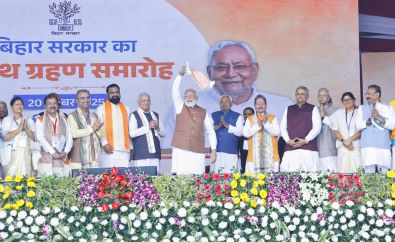Aurangzeb’s Legacy Sparks Fresh Debate in Indian Politics
AIMIM Bihar unit chief and MLA Akhtarul Iman has stirred controversy by hailing Mughal Emperor Aurangzeb as a “noble emperor” who created ‘Akhand Bharat’.
His remarks came amid the ongoing political debate surrounding Samajwadi Party MLA Abu Azmi’s statements on the Mughal ruler.
Iman, while speaking to news agency ANI, emphasized that Aurangzeb was different from the British colonizers as he did not loot India but rather contributed to its governance.

The statements have sparked fresh debates on Aurangzeb’s rule, his policies, and his impact on Indian history.
AIMIM Leader’s Statement on Aurangzeb and ‘Akhand Bharat’
AIMIM MLA Akhtarul Iman, while speaking to the media, made a bold claim that Aurangzeb unified India and made it ‘Akhand Bharat’.
He further asserted that the Mughal emperor strengthened India’s political structure and ruled with a vision of national integration.
Key Points from Akhtarul Iman’s Statement:
- Aurangzeb was a “noble emperor” and played a crucial role in unifying India.
- Unlike British colonizers, Aurangzeb did not exploit India but rather worked for the administration of the country.
- His rule saw expansion of the Mughal Empire to its largest extent, covering modern-day India, Pakistan, Bangladesh, and parts of Afghanistan.
- The MLA claimed that Aurangzeb’s governance helped in establishing strong administrative frameworks in India.
Abu Azmi’s Statements on Aurangzeb: A Political Firestorm
Samajwadi Party leader Abu Azmi had earlier praised Aurangzeb, stating that during his reign, India’s borders extended to Afghanistan and Burma (Myanmar).

He also refuted claims that Aurangzeb was a cruel ruler, arguing that the Mughal emperor was a fair administrator who even built temples.
Key Points from Abu Azmi’s Statement:
- Aurangzeb was not a “cruel ruler”, as often depicted.
- The conflict between Aurangzeb and Chhatrapati Sambhaji Maharaj was about state governance, not religious differences.
- During Aurangzeb’s rule, the Mughal Empire reached its peak, stretching across South Asia.
- Aurangzeb’s administration focused on law and order, taxation reforms, and military expansion.
Azmi’s statements have sparked political backlash, with historical scholars and political leaders divided on their opinions regarding Aurangzeb’s rule.
The Historical Debate on Aurangzeb’s Rule
The debate over Aurangzeb’s rule in Indian history has always been contentious. While some view him as a powerful and strategic leader, others criticize his reign for religious intolerance and oppressive policies.
Arguments in Favor of Aurangzeb:
- Largest expansion of the Mughal Empire in history.
- Efficient administration with structured tax reforms.
- Military strength that kept the empire unified for decades.
Arguments Against Aurangzeb:
- Imposed Jizya tax on non-Muslims, which was seen as religious discrimination.
- Demolition of temples, including the Kashi Vishwanath temple.
- Persecution of Sikh Gurus and Hindu rulers, including the execution of Guru Tegh Bahadur.
Historians remain divided on whether Aurangzeb was a visionary leader or an oppressive ruler.
Political Reactions to the Controversy
The statements by Akhtarul Iman and Abu Azmi have triggered sharp political reactions. Leaders from various parties have condemned the remarks, while some have supported their claims.
Statements from Political Leaders:
- BJP leaders have criticized the remarks, calling them an attempt to glorify a ruler known for religious intolerance.
- Congress leaders have taken a neutral stance, urging people to focus on present-day issues rather than historical debates.
- Historian groups have emphasized the need for balanced historical perspectives, considering both the achievements and controversies of Aurangzeb’s reign.
Aurangzeb’s Impact on India’s Historical Legacy
Aurangzeb ruled India for nearly 50 years (1658–1707), and his policies left a lasting impact on Indian history, politics, and society.
Key Contributions of Aurangzeb:
- Established a vast empire covering most of the Indian subcontinent.
- Introduced Sharia-based governance in administrative and legal matters.
- Strengthened Mughal military forces through strategic expansion.
However, his strict Islamic policies and conflicts with Hindu rulers and Sikh Gurus remain subjects of intense debate.
The Debate Over ‘Akhand Bharat’ and Mughal Rule
The claim that Aurangzeb created ‘Akhand Bharat’ has raised questions about the historical interpretation of the term.

The concept of Akhand Bharat refers to a unified Indian subcontinent, but historians argue that the Mughal Empire’s expansion cannot be equated with modern nationalism.
Key Differences Between Mughal Empire and ‘Akhand Bharat’:
- Mughal rule was imperialistic, not nationalistic.
- Modern-day India, Pakistan, and Bangladesh were under Mughal control, but they were governed as a monarchy, not a unified republic.
- ‘Akhand Bharat’ is a modern political term, whereas Mughal rule was based on dynastic expansion.
Conclusion: History and Politics Intertwined
The statements by AIMIM MLA Akhtarul Iman and SP leader Abu Azmi have reignited the debate on Aurangzeb’s rule and his impact on Indian history.
While some view him as a unifier and a strong administrator, others criticize him for religious intolerance and authoritarian policies.
The political discourse surrounding historical figures like Aurangzeb, Chhatrapati Shivaji Maharaj, and other rulers continues to shape contemporary debates.
As India moves forward, understanding history with factual accuracy and balanced perspectives remains crucial.





